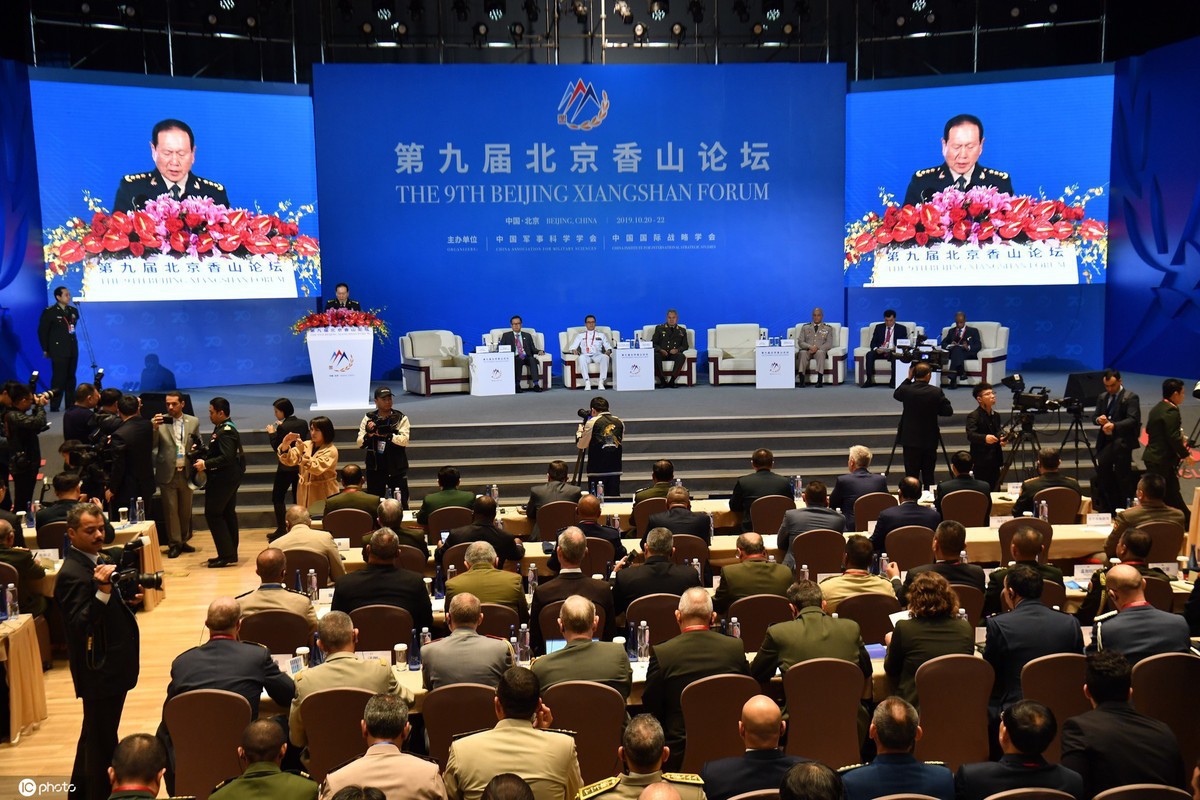
Given the record number of star-studded attendees and the pressing security-related topics discussed, this year's Beijing Xiangshan Forum, which ended last week, was arguably the most relevant and important one since its launch in 2006, experts have said.
Senior Colonel Zhao Xiaozhuo, director of the forum's secretariat office, said the scope and scale of the event has greatly expanded in recent years due to its tighter focus on current international situations and its inclusive environment for dialogue.
The Xiangshan forum was created on the principles of equality, openness, inclusiveness and mutual learning 13 years ago. It is sponsored by the China Association for Military Science of the People's Liberation Army Academy of Military Science, and the China Institute for International Strategic Studies.
Based on the theme of "Maintaining International Order and Promoting Peace in the Asia-Pacific", this year's forum, from Oct 20 to 22, featured four major topics: big nation relations and global order; Asia-Pacific security risks and management; interests and joint security of small and medium-sized countries; and international arms control mechanisms and global stability.
The panel discussions featured security topics including counterterrorism, maritime security, Asia-Pacific security architecture and the use of artificial intelligence in future warfare.
Among the more than 1,300 attendees were 23 defense ministers and 76 formal delegations from various countries and international organizations, according to forum organizers.
President Xi Jinping also sent a congratulatory letter to the forum, saying that maintaining lasting peace and prosperity in the Asia-Pacific is in the common interest of all countries and regions in the area.
Senior Colonel Jiang Xinfeng, a researcher from the PLA academy, said when the forum first started it only had around 60 attendees from 14 countries.
"It was more like a round-table discussion than a full forum," Jiang said. "But now, the forum is full of friends and noted guests. This not only reflects our nation's growing capability, but also proves that our defense policies are becoming more understood and accepted by the international community."
A platform for all voices
Zhao said that China has made great progress in global integration since launching its reform and opening-up efforts, but it is also facing increasingly complex challenges.
"Some big nations have even considered China as a strategic competitor. This in some ways has affected China's peaceful development progress," Zhao said."Therefore, it is crucial for China to conduct dialogues with other nations to resolve misunderstandings and help them better understand China."
"We have many bilateral security exchange mechanisms with other countries, but multilateral platforms like the Xiangshan forum is a rarity, thus it is very important for China's military diplomacy and security dialogue," he said.
Apart from the typical topic of big nation competitions between China, Russia and the United States, Latin America is also facing new security issues as Brazil clashes with neighbor Venezuela over border migrant issues.
In Africa, Egypt and Ethiopia are currently in a tense standoff over the use of the water in the Nile River, a result of Ethiopia's plans to build a hydropower dam on the river's upstream.
The speakers also warned against the increasing spread of terrorism to countries from Central Asia and ASEAN after the neutralization of the Islamic State in Syria.
Given these issues, Zhao said, the Xiangshan forum is also a key platform for defense officials, especially from small and medium-sized countries, to voice their opinions, build strategic trust with peers and find common ground for cooperation.
Jin Canrong, vice-president of the School of International Studies at Renmin University of China, said there are many high-level security forums in the world, including the Shangri-La Dialogue in Singapore and the Munich Security Conference in Germany.
However, Jin said the Shangri-La Dialogue is backed by the United Kingdom and the US, and it tends to have an unfriendly atmosphere toward competitors like China and Russia. The Munich conference focuses mostly on issues in Europe, so many other smaller nations' voices go unheard.
Major General Albert Murasira, Rwanda's defense minister, said small and medium-sized nations have little chance and time to voice their positions on the world stage.
"But the Xiangshan forum has offered a voice to all delegates, and it is a great opportunity to convey our message," Murasira said.
Tea Banh, Cambodia's defense minister, said in his speech that competition between big nations can often sacrifice the interests of smaller nations. Yet China has maintained a fair and cooperative relationship with other Southeast Asian countries regardless of their size.
"This is sufficient proof that a foreign policy based on win-win cooperation is reasonable and practical," he said.









